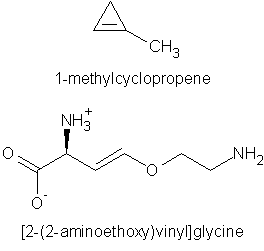Ethylene: Controlling ripeness
Chemical & Engineering News, 29 October 2007, 10-15


Hormones, notably the gaseous compound ethylene, control the ripening of fruits such as bananas and tomatoes. When ethylene is detected by a fruit, it begins ripening and produces more ethylene. The resulting chain reaction can cause an entire shipment of fruit to spoil before it can get to market.
A combination of strategies is used to combat this process, including selective breeding, genetic engineering and the use of ethylene and ethylene antagonists at appropriate points in the harvesting and shipping of fruit. Two commonly used antagonists are the gas 1-methylcyclopropene, which blocks the uptake of ethylene, and the solid [2-(2-aminoethoxy)vinyl]glycine, which prevents the biosynthesis of more ethylene as a fruit ripens.
Ethylene is our Molecule of the Month. For the full story, including more about plant hormones such as auxin and gibberellic acid, see the article cited above.